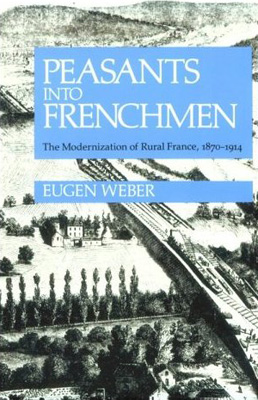Many people today write histories of nations. They create a narrative about the origins of a nation and then follow its development through time.
That is one way to write history. However, many scholars who study about nations argue that viewing groups of peoples as “nations” is a modern phenomenon.
Eugen Weber’s Peasants into Frenchmen: The Modernization of Rural France, 1870-1914 (Stanford: Stanford University Press, 1976), for instance, argues that it was only at the end of the nineteenth century that many people in “France” came to see themselves as “French.” Before that time most people had a local, rather than a national, identity.
Then you have a non-academic book like Cecil Jenkins’ A Brief History of France (Philadelphia: Running Press, 2011), where the table of contents demonstrates that the author talks about all of history in the area that we today refer to as “France.”
However, he also follows Weber in saying that the sense of being French is very recent. To quote, he says that,
“Frenchness is largely a historical construct, as indeed is the country itself. . . And French national feeling, in a country where barely 10 per cent of the inhabitants spoke French before the Revolution [1789], is largely the effect of Napoleonic conscription [~1799-1815] and the introduction of schooling with patriotic indoctrination by the Third Republic [1870-1940].” (4-5)
So there is somewhat of a contradiction here. If “France” and the sense of being “French” is modern, then how can a book about “France” start in ancient times?
On the other hand, while “France” and the sense of being “French” is new, some of the people who live in the area of what we today call “France” do have ancestors who lived in that area going back for hundreds or even thousands of years, even though they never thought of themselves as “French” until maybe 100 years ago. So doesn’t it make sense to write about them?
This then is the key point: While we can in some cases trace blood over a long period of time, we cannot trace a single consciousness or identity over that same long period.
With that in mind, if I was to write a history of the area of what is today the Red River Delta and to talk about the people who have historically lived there, how would I do it?
Well the first thing I would do would be to try to get a good understanding of the term “Việt.” Where did it come from?
We know that in the first millennium BCE people who lived in the area near the Yellow River referred to people who lived to their south, and whom they perceived to be different from them as “Việt/Yue,” and that they created the term Bách Việt/Baiyue (i.e., “Hundred Việt/Yue”) to refer to those peoples collectively.
On the other hand, there is very little evidence that any of these “Hundred Việt/Yue” actually referred to themselves as “Việt/Yue.” We essentially have no idea what these various peoples thought of themselves, or how they referred to themselves. All we know is that the term “Việt/Yue” was created and used by outsiders.
[For more on this, see Erica Brindley, “Barbarians or Not? Ethnicity and Changing Conceptions of the Ancient Yue (Viet) Peoples, ca. 400–50 BC,” Asia Major 16.1 (2003): 1–32.]
As we move from the end of the BCE period through the first millennium CE, we do find certain members of the elite in the area of what is today southern China and northern Vietnam employ the term Việt/Yue in certain political contexts.
At the end of the third century BCE, Zhao Tuo referred to himself as the Emperor of Nam Việt/Nanyue, with a capital in the area of what is today Guangdong Province.
In the sixth century CE, Lý Bí also declared himself the emperor of a Nam Việt in the area of what is today northern Vietnam.
In the early seventh century, Lin Shihong declared himself King of Nam Việt/Nanyue, from where he was based in the area of what is now Jiangxi Province.
Also in the seventh century, a powerful man in the area of what is now Guangdong Province, Feng Ang, was encouraged by his supporters to declare himself King of Nam Việt/Nanyue, but he declined to do so.
In 917, a Kingdom of Dại Việt/Dayue was established in what is today Guangdong Province.
And later in that same century, a Kingdom of Đại Cồ Việt was established in the area of what is today northern Vietnam.
So the term Việt/Yue appeared in certain political contexts over a period of more than 1,000 years in an area stretching from what is today Jiangxi Province to the Red River Delta.
What does this demonstrate? It shows that the elite across this area were literate enough to know that in ancient times the term Việt/Yue was associated with that part of the world, and they used the term in their titles.
What does this tell us about the common people who lived in that same area? Absolutely nothing. We have no idea what they thought about themselves, or what they thought about the people who declared the establishment of these kingdoms.
Given the fact that this was a premodern world with limited communications and very little schooling, it’s reasonable to assume that most people lived their entire lives in villages and had little if any knowledge of anything beyond their rice fields.
(to be continued. . .)





This Post Has 4 Comments
Dear Mr.Le Minh Khai,
Have you already prepared (published-?) the promised continuation for this post? I am waiting for the whole text to comment some points.
Anh thank you for the first part!
No, I’ve been lazy. . . I’ll try to continue this soon. Thanks for reminding me.
Reblogged this on tuetrung and commented:
The term Bách Việt was not used by people above the Yellow River around that time yet.